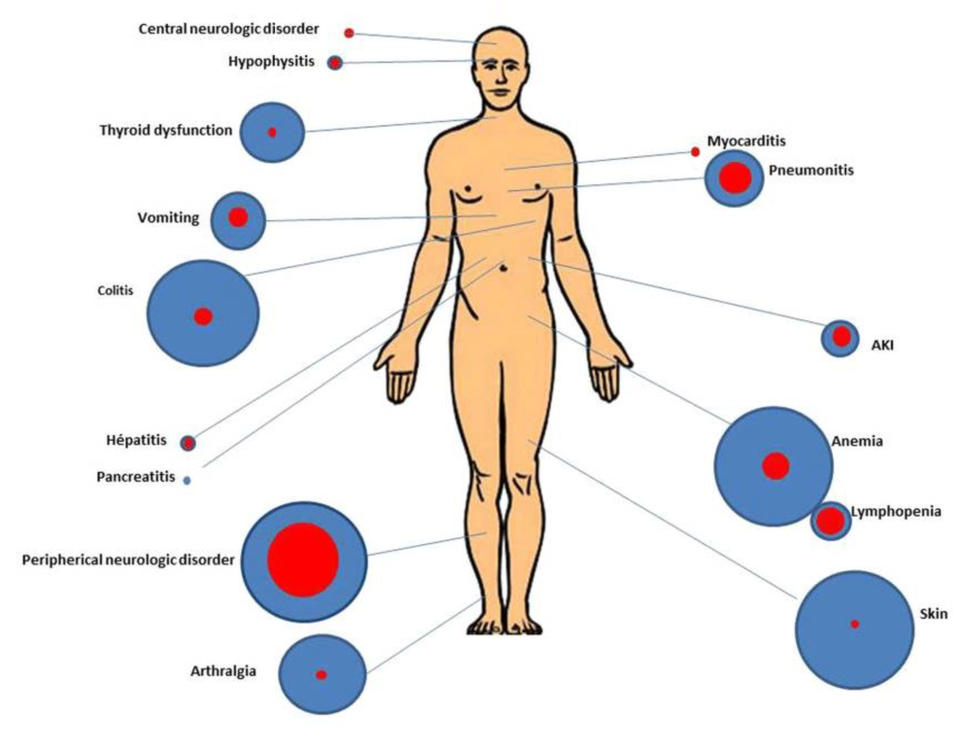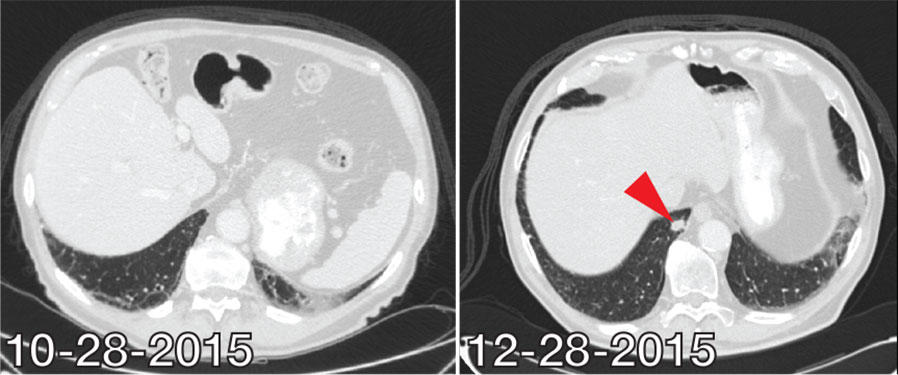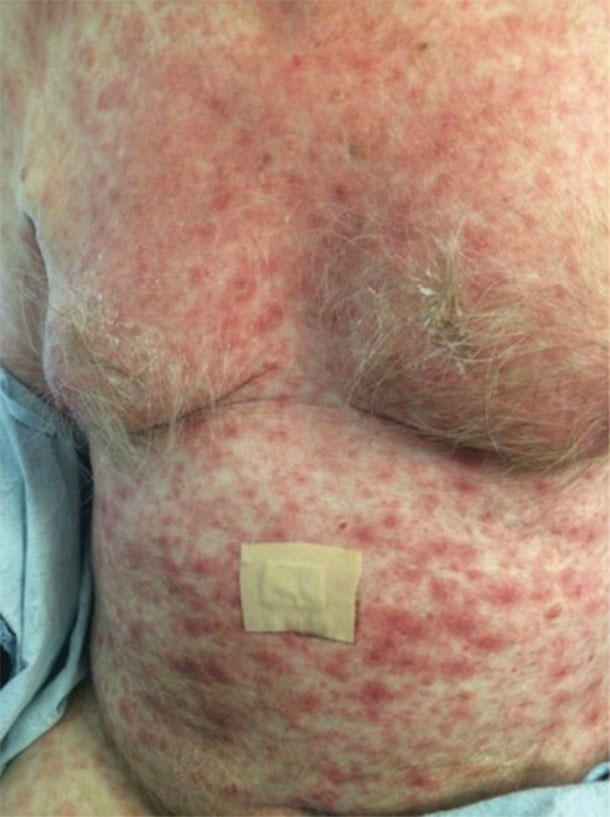New Drugs, New Side Effects: Complications of Cancer Immunotherapy
, by Edward Winstead
A growing number of people with cancer have benefited in recent years from immunotherapy—treatments that strengthen the ability of the immune system to detect and destroy cancer.
Some patients have had dramatic and lasting responses to these new treatments, which include immune checkpoint inhibitors and CAR T-cell therapies. In rare cases, patients with advanced cancers have had their tumors disappear completely following treatment with immunotherapy.
But immunotherapy drugs, like all medicines, can cause side effects, including rare complications that, for some patients, may be life threatening.
“Side effects related to immunotherapy drugs occur frequently and can affect almost any organ in the body,” said Sarah Dubbs, M.D., an emergency medicine physician at the University of Maryland School of Medicine who has written about the side effects of cancer immunotherapy.
“Most side effects are mild to moderate in severity and respond to treatments such as steroids,” Dr. Dubbs continued. Doctors caring for patients who are receiving immunotherapy must be vigilant, however, because some patients may develop serious health problems, she added.
As immunotherapy has become a more widely used treatment for cancer, researchers have gained insights into the side effects associated with these treatments, including some complications not previously linked to other cancer treatments.
Building on that work, researchers are now trying to better understand how and why these side effects occur in certain patients and develop strategies for managing them.
An Overly Active Immune System
Drugs that stimulate the immune system to attack tumor cells can, in some patients, cause the immune system to recognize some of the body’s healthy tissues as foreign and attack them.
Some patients receiving immunotherapy develop inflammation of the inner lining of the colon, the lungs, or heart muscle, among other side effects associated with an overly active immune system.
Understanding more about the causes of immunotherapy-related side effects and being able to identify patients most at risk for them could help doctors to select immunotherapy drugs for patients in the future, noted Dr. Dubbs.
To advance research in this area, investigators have been documenting complications associated with immunotherapy drugs, studying the biological mechanisms, modifying immunotherapy drugs to reduce their side effects, and increasing awareness of potential side effects among clinicians and patients.
For example, the side effects of immunotherapy drugs and new ways to manage them were discussed at a recent scientific meeting on emergency medicine for treating patients with cancer, hosted by the University of Texas MD Anderson Cancer Center.
“As emergency room doctors, we are the first line of care, and we need to educate ourselves about new technologies in medicine and be ready to care for our patients,” Dr. Dubbs said.
“When we get a patient’s medical history, we ask what immunotherapy treatment they’re on and it’s important to be specific,” she continued. “With different types of chemotherapy, it was not as important to know exactly which type, because the drugs behave similarly in the body.
“But with immunotherapy drugs it matters, because there are different adverse events associated with different medications, and treatment may vary depending upon which immunotherapy drug a patient had received,” Dr. Dubbs added.
Enhancing the Immune Response
The immune-related side effects of immunotherapy highlight a fundamental difference between these drugs and other cancer treatments: Conventional treatments such as chemotherapy kill tumor cells directly, whereas immunotherapy does not.
Immune checkpoint inhibitors, for example, block proteins that help keep the immune response in check, such as CTLA-4, PD-1, or PD-L1 (a protein that PD-1 attaches to). Blocking one of these proteins “releases the brakes” on the immune system, boosting the ability of immune cells to attack tumor cells.
CAR T-cell therapy uses a different approach to reach the same goal: A patient’s T cells are modified in the laboratory to enhance their ability to recognize and bind to cancer cells and kill them. These modified cells are then expanded in number and infused back into the patient.
Treatment-Related Side Effects Vary
The types of side effects a person receiving immunotherapy experiences will depend on several factors, including the type of immunotherapy, the dose, how healthy the person was before treatment, the type of cancer, and how advanced the cancer is.
For patients receiving immunotherapy drugs that are given intravenously, the most common side effects include skin reactions at the site of the injection, such as pain, swelling, and soreness. Some immunotherapy drugs may cause severe or even fatal allergic reactions, though this is rare.
Not all patients receiving immunotherapy drugs develop immune-related complications. And among patients who do develop these side effects, there is substantial variation in which organs are affected, noted Sang T. Kim, M.D., and Maria E. Suarez-Almazor, M.D., Ph.D., of MD Anderson in a recent commentary on managing side effects associated with checkpoint inhibitors.
Among patients receiving checkpoint inhibitors, the most commonly affected parts of the body are the skin, colon, endocrine system, liver, lungs, heart, musculoskeletal system, and central nervous system, Drs. Kim and Suarez-Almazor added.
Many patients who receive CAR T-cell therapy develop a condition known as cytokine release syndrome, which can cause a fever, fast heart rate, low blood pressure, and rash, among other symptoms. The syndrome is caused by the large and rapid release of proteins called cytokines into the blood from immune cells affected by immunotherapy.
Cytokine release syndrome generally develops within hours to days after an infusion; most patients have a mild reaction to the infusion, but some have more severe responses. Patients also may experience neurologic symptoms such as confusion, tremors, or difficulty communicating.
Unusual and Unexpected Side Effects
The timing of immunotherapy-related side effects is less predictable than with other types of cancer treatments. Patients receiving immunotherapy may develop side effects soon after receiving the first dose of a drug or long after a course of treatment has ended.
Physicians at MD Anderson reported recently, for example, that a patient being treated for sarcoma developed a serious complication of diabetes about 3 weeks after receiving a single dose of the immunotherapy drug pembrolizumab (Keytruda).
The 47-year-old woman, who had no known history of diabetes and had not received immunotherapy previously, was diagnosed with diabetic ketoacidosis during a trip to the emergency room.
“This case of abrupt adult-onset type 1 diabetes mellitus is an example of the undesirable side effects that can emerge after only a brief exposure to an immune checkpoint inhibitor,” Patrick Chaftari, M.D., and his colleagues wrote in a case report about the patient.
Patients receiving checkpoint inhibitors should “be closely monitored” so that potentially life-threatening complications can be diagnosed early and treated, the authors added.
It was after a routine scan a few years ago that doctors identified a suspicious mass in the lungs of an 83-year-old man participating in a clinical trial. The man had been receiving pembrolizumab for about 5 months to treat a type of skin cancer called Merkel cell carcinoma.
Further testing revealed something completely unexpected: While receiving a drug that strengthens the immune response against cancer, the patient developed tuberculosis.
“I was, of course, floored,” said Elad Sharon, M.D., M.P.H., of NCI’s Cancer Therapy Evaluation Program, who monitored side effects on the clinical trial for NCI. Nothing in the patient’s health history indicated that he’d been infected with the bacterium that causes tuberculosis, Mycobacterium tuberculosis (Mtb).
The patient was treated for both tuberculosis and cancer by infectious disease specialists and oncologists who worked in close consultation, and he is still alive, Dr. Sharon noted.
To understand what had happened, Dr. Sharon and his colleagues conducted an analysis of the patient’s disease with Daniel Barber, Ph.D., of the National Institute of Allergy and Infectious Diseases (NIAID), who has studied Mtb and immune responses in mice.
Their results were consistent with findings in mice showing that the use of an immunotherapy drug to boost the immune response can increase the risk or severity of tuberculosis, Dr. Barber and his colleagues reported last year, along with a second case of tuberculosis following immunotherapy.
“We’ve known for a long time that when we boost the responses of immune cells, it can be a good thing or a bad thing,” said Dr. Barber. Among individuals infected with Mtb, boosting the immune response “may be detrimental,” he added.
Managing Treatment-Related Side Effects in Patients
Because cancer immunotherapy drugs are relatively new, there is limited evidence from clinical trials about how to manage treatment-related side effects. “These drugs are so new that many emergency physicians and even some oncologists might not be aware of the potential side effects,” said Dr. Dubbs.
Recognizing this gap in knowledge, the American Society of Clinical Oncology and the National Comprehensive Cancer Network in 2018 issued guidelines for clinicians on managing complications of checkpoint inhibitors. The guidelines include recommendations on when to use steroids and when to discontinue immunotherapy, for example.
A panel of experts developed the guidelines based on a review of the scientific literature. These guidelines provide “best practices” for the management of immune-related side effects within the constraints of limited scientific evidence, noted Drs. Kim and Suarez-Almazor in their editorial. Other organizations also have developed guidance on how to best manage immunotherapy side effects.
Even though many questions about managing immune-related side effects remain unanswered, experts agree on the importance of diagnosing immune-related side effects before they progress to more serious complications.
“Our responsibility is to treat any kind of side effect related to immunotherapy early and effectively,” said Monjur Ahmed, M.D., a gastroenterologist at Thomas Jefferson University, who has written about the side effects of checkpoint inhibitors.
Dr. Ahmed noted that for some patients, this will involve stopping an immunotherapy drug, at least temporarily, and employing drugs such as steroids to treat the immune-related side effects.
“Some patients go back on the same treatment, and some do not,” he said. Identifying the optimal approaches for managing certain side effects will require more research, he added.
“Am I Eligible for Immunotherapy?”
In 2018, the most common question that Emil Lou, M.D., Ph.D., heard from patients with cancer in his clinic at the University of Minnesota was: “Am I eligible for immunotherapy?”
“Most of these patients had seen advertisements for immunotherapy on television or heard a story about a patient’s tumor melting away, and they wanted to know if they could get immunotherapy,” said Dr. Lou, who treats patients with gastrointestinal cancers.
His patients had heard of dramatic and lasting responses to immunotherapy drugs among some patients with advanced cancers.
Although few of his patients have been candidates for immunotherapy based on the genetic features in their tumors, Dr. Lou has discussed the treatment—and possible side effects—when it has been an option.
In these conversations, he would introduce the idea that immunotherapy drugs have side effects. “In that respect, immunotherapy drugs are like all treatments for cancer,” he tells his patients. “They can cause rashes and joint pain and diarrhea. And in a small percentage of patients, immunotherapy can cause shortness of breath and other more serious complications.”
Dr. Lou added, “Immunotherapy drugs are not perfect.”
More Research Needed on Immunotherapy-Related Side Effects
Knowledge gained from decades of treating autoimmune disorders has informed the ways that doctors identify and manage immune-related side effects, noted Dr. Sharon.
But he pointed out that immunotherapy-related side effects may develop through different biological mechanisms than autoimmune disorders, which suggests that the treatment of these side effects may also differ.
To more effectively explore such questions, doctors and researchers need to establish definitions of immunotherapy-related side effects and develop standards for reporting these side effects as they are observed in patients, Dr. Sharon noted.
Doctors could use definitions of immune-related side effects to identify patients who may need to be referred to specialists for treatment, he added.
“In addition to definitions, new biomarkers and tests for diagnosing immune-related side effects are needed, and that will require collaboration from experts across disciplines,” he said.
Dr. Sharon was one of the organizers of a scientific workshop on cancer, autoimmunity, and immunology held last year that brought together experts from different fields to discuss a range of topics, including immune-related side effects.
During a keynote presentation at the meeting, Jeffrey Bluestone, Ph.D., of the University of California, San Francisco, said: “We still have a lot to learn.”
Among other questions, it’s not clear why immune-related side effects occur in some patients but not in others or why different drugs induce different diseases in different patients, he added.
Whether treatment-related side effects could be an indication that a patient might be responding to immunotherapy is an area of ongoing research that was discussed at the workshop.
“We’d like to know whether having immune-related side effects could be a good sign for a patient’s treatment,” Dr. Sharon said, noting that there “isn’t any definitive evidence yet on this question one way or the other.”
Answering such questions could take years, but efforts are under way to advance the research.
For example, NCI has established a network of laboratories and a data center that could help identify biomarkers associated with the response to immunotherapy or treatment-related side effects. And researchers are working on developing mouse models for immunotherapy research as well as a biorepository for patients in immunotherapy clinical trials.
Some of these efforts and related ongoing work were discussed at the second workshop on cancer, autoimmunity, and immunology, which was sponsored by the National Institutes of Health and the American Association for Cancer Research, on April 15–16, 2019. [Recordings of both days of the workshop are available on the NIH Videocast website: day one and day two.]
“As we did last year, we brought together experts from different fields to help us to better understand these important new immunotherapy drugs, which are a real advance for patients,” said Dr. Sharon.



